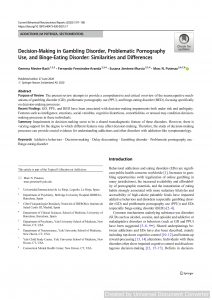Mental Health
Decision-Making in Gambling Disorder, Problematic Pornography Use, and Binge-Eating Disorder
 Full Article Title: Decision-Making in Gambling Disorder, Problematic Pornography Use, and Binge-Eating Disorder: Similarities and Differences
Full Article Title: Decision-Making in Gambling Disorder, Problematic Pornography Use, and Binge-Eating Disorder: Similarities and Differences
Open Access: No
Abstract
Purpose of Review The present review attempts to provide a comprehensive and critical overview of the neurocognitive mechanisms of gambling disorder (GD), problematic pornography use (PPU), and binge-eating disorder (BED), focusing specifically on decision-making processes.
Recent Findings GD, PPU, and BED have been associated with decision-making impairments both under risk and ambiguity. Features such as intelligence, emotions, social variables, cognitive distortions, comorbidities, or arousal may condition decision-making processes in these individuals.
Summary Impairments in decision-making seem to be a shared transdiagnostic feature of these disorders. However, there is varying support for the degree to which different features may affect decision-making. Therefore, the study of decision-making processes can provide crucial evidence for understanding addictions and other disorders with addiction-like symptomatology.
Citation
Mestre-Bach, G., Fernandez-Aranda, F., Jimenez-Murcia, S., & Potenza, M. N. (2020). Decision-making in gambling disorder, problematic pornography use, and binge-eating disorder: Similarities and differences. Current Behavioral Neuroscience Reports, 7(3), 97–108. https://doi.org/10.1007/s40473-020-00212-7
